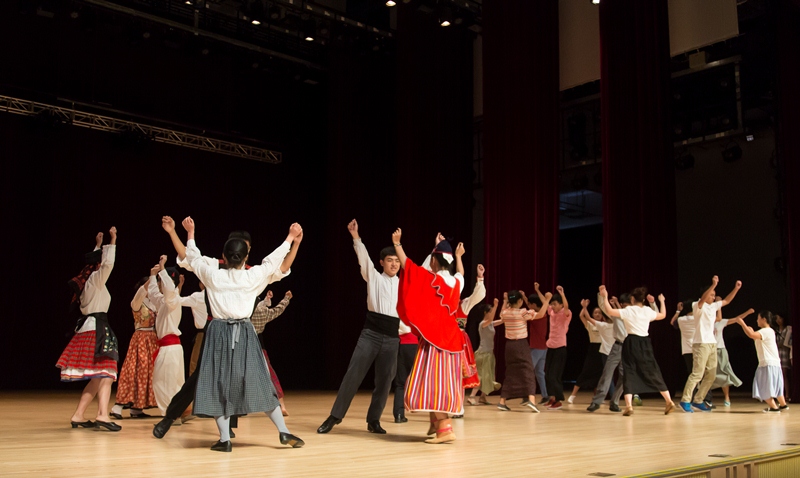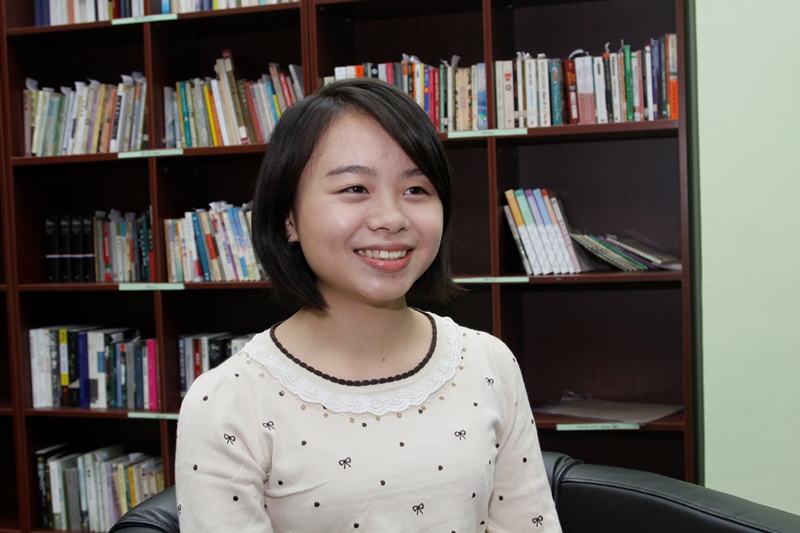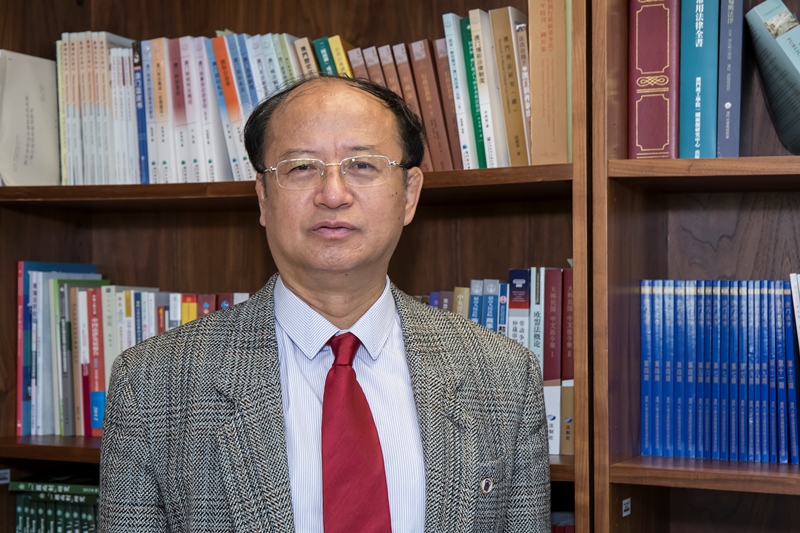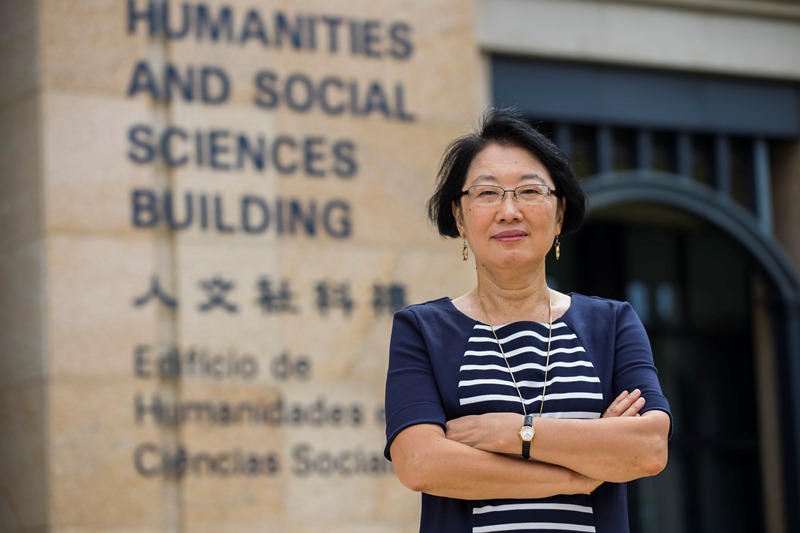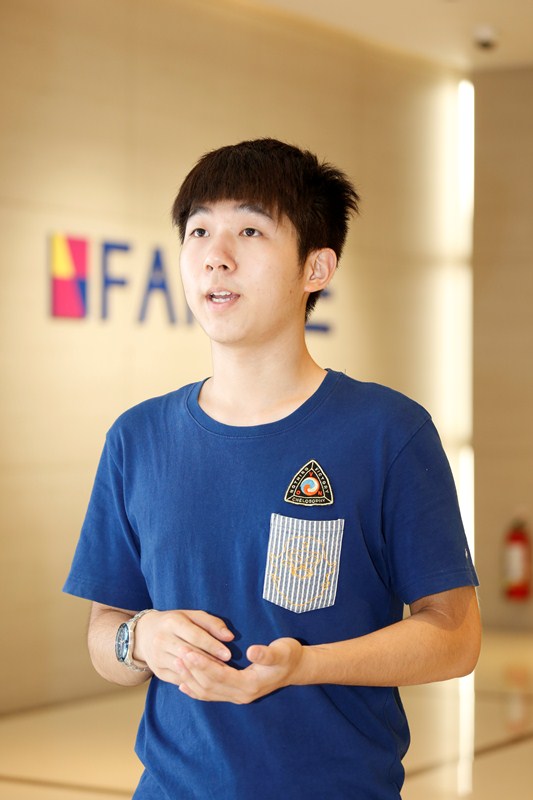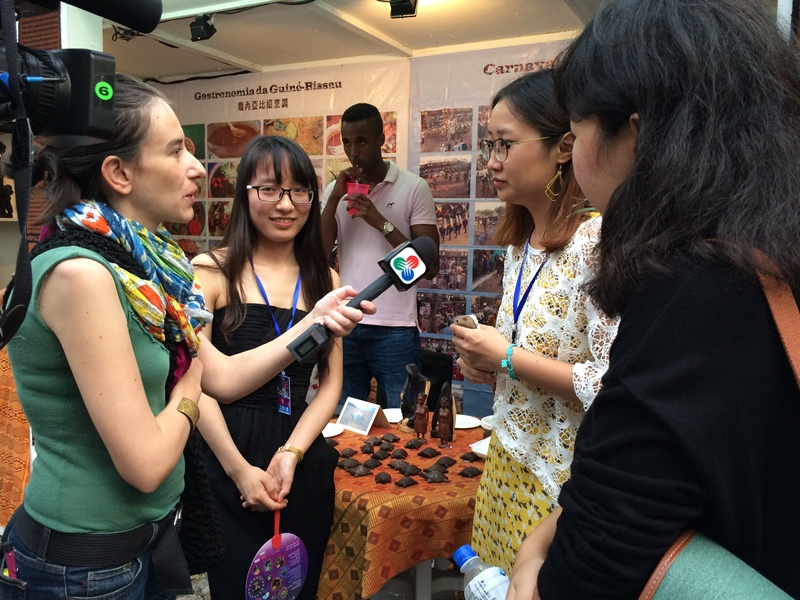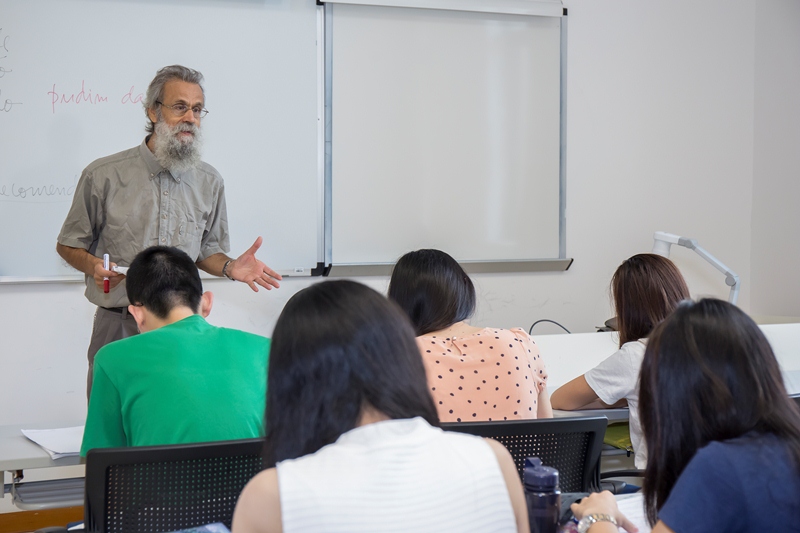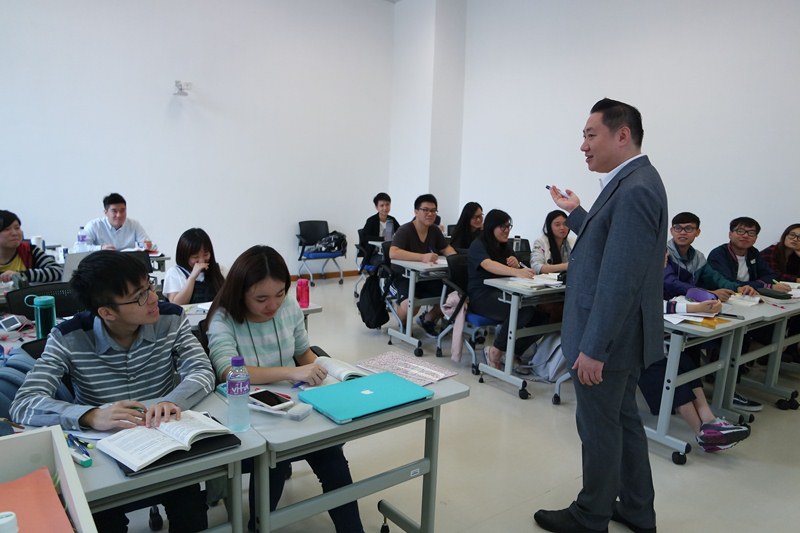Source: umagazine
As the tertiary educational institute that offers the largest number of Portuguese courses in Asia, the University of Macao (UM) has made good use of the city’s Portuguese history and multicultural texture to cultivate bilingual professionals who are fluent in both Chinese and Portuguese. Anticipating the next wave of economic development in Macao and mainland China, both the Faculty of Arts and Humanities (FAH) and the Faculty of Law (FLL) will enhance their academic mission—innovating and revising their respective curricula in an effort to adapt to the rapidly changing international environment, and to discover the best means to train bilingual or even multilingual students.
New Bilingual Bachelor of Law Programme
Though Brook Tan represented Macao in numerous national and international science and technology competitions when she was in secondary school and received several awards at these competitions, she chose not to study the sciences at UM. Instead, she opted to enrol in a five-year bachelor of law programme, which was inaugurated by UM last year, and which is conducted in both Chinese and Portuguese languages. ‘Even in the fields of science and technology, there will be many opportunities for those working in the legal profession to resolve problems, and science and technology law is underdeveloped in Macao. Moreover, I have been interested in Portuguese since I first learned it in Form 6,’ she says. ‘When UM launched this new programme last year, I asked myself why not combine both things that I like in my major?’
This new programme has not been a disappointment. After participating in an exchange at the University of Coimbra, Portugal, in the first academic year, Tan’s Portuguese-language skills have increased tremendously: in less than 10 months, she achieved B2 level on the CAPLE (Centre for Evaluation of Portuguese as a Foreign Language) examination, which is the third highest of five levels in a test widely used to determine the fluency of non-native Portuguese speakers. ‘Right now most of us have a pretty good foundation in Portuguese. We only need to consolidate our knowledge after the exchange,’ Tan says. ‘This new programme is challenging, but if I can graduate successfully I believe I will have a competitive edge over others because Macao requires many people in the legal profession who are fluent in both Chinese and Portuguese.’
Producing Bilingual Graduates for the Legal Profession
Since the central government clearly stated in the 12th five-year plan that it supports Macao’s development into a world tourism and leisure centre, as well as a service platform for economic and trade cooperation between China and Portuguese-speaking countries (commonly known as ‘one centre, one platform’), the demand for legal professionals fluent in both Chinese and Portuguese has increased. Chair Professor Shijian Mo, dean of UM’s Faculty of Law (FLL), says the faculty is assisting the authorities to educate bilingual legal professionals, and most of Macao’s new magistrates and lawyers in recent years have graduated from UM, reflecting the faculty’s achievement in this sector. But he points out that the biggest difficulties in grooming bilingual legal professionals involve the students’ background linguistic knowledge and their time limitations, saying: ‘Most of our students did not learn Portuguese in secondary school, so it is really hard for them to study both the Portuguese language and law at the same time.’
Therefore, last year the FLL launched the five-year bachelor of law programme which is conducted in both Chinese and Portuguese, in addition to existing law programmes conducted exclusively in either Chinese or Portuguese. More than 20 students joined the first intake of the inaugural programme, which requires them to study in Portugal for the first academic year, and to study law courses in both Chinese and Portuguese in the subsequent four years (Portuguese law courses must account for 40 per cent of the total law courses). With the requirement of one additional year as compared to other bachelor programmes, the FLL hopes more students will reach the professional standards in both Chinese and Portuguese legal services after graduating from the programme.
Prof Mo remarks: ‘Bilingual students will undoubtedly have more advantages in the employment market. When we designed the curriculum of this bilingual law programme, we decided to allow all FLL students to participate in it. For instance, a student in the Chinese law programme can attain a bilingual law degree if he or she passes the Portuguese proficiency test and completes 40 per cent of the law courses in Portuguese. Our ultimate goal is that most of our students will be able to function professionally in both languages.’
Grooming Trilingual Students and Clarifying Teaching Goals
While attending the opening ceremony of the 25th annual meeting of the Association of Portuguese Speaking Universities held in Praia, Cape Verde, in July, UM Rector Wei Zhao emphasised that the courses offered by both the FLL and the Department of Portuguese of the FAH reflect the work UM has done in recent years to promote the use of Portuguese. As UM is now the president of the association, Rector Zhao pledged that the university would facilitate the development of other Portuguese-speaking institutions and promote Portuguese language and culture across the globe.
Chair Professor Hong Gang Jin, dean of the FAH, says the Department of Portuguese is not only the oldest department at UM, but it is also the largest Portuguese department outside Portugal and Brazil. Over the years, the department has been committed to studying the Portuguese language and culture and training students’ skills in the Portuguese language. Currently the department offers bachelor’s, master’s and PhD programmes. The total number of students enrolled in these programmes has increased from 50 in 2008 to 87, a yearly increase of between 20 and 35 per cent. Incorporating the government’s vision to establish ‘one centre, one platform’ in Macao, the FAH has positioned itself as a base for ‘grooming trilingual students who are fluent in Chinese, English and Portuguese’.
Dean Jin says: ‘As the pillar industries of the city are gaming and tourism, the socio-economic development of Macao depends on the language skills of its residents. So it is essential to develop professionals who are fluent in Chinese, English and Portuguese. Besides, the multilingual environment in Macao is conducive to language learning. Our goal is to ensure that students majoring in Portuguese will be able to earn a minor degree in English, while those majoring in English can earn a minor in Portuguese.’
Since taking office in December last year, Dean Jin—a seasoned linguist— has begun reforming the bachelor’s programme in Portuguese Studies, explicating the specific learning outcomes and teaching goals of the four-year programme, to be achieved in three phases. First, there will be an emphasis on basic language training during the first two years, through an intensive and interactive methodology, so that the students’ Portuguese proficiency can reach B1 or B2 level. Second, the faculty will increase the number of available student exchanges at universities located in Portuguese-speaking countries so that each student in the department will ultimately complete an exchange; this will compare favourably with the current exchange rate of about 70 per cent. Third, there will be a focus on content-based instruction in the third and fourth years, when the language skills of the students will be applied to translation, literature, linguistics, and other areas.
Cooperation and Exchange to Create a Good Learning Environment
Intending to conclude the reform of the Portuguese Studies curriculum within the next two years, Prof Jin says she hopes to develop cooperative projects with other universities in Portuguese-speaking countries over the next three to five years. Signing such partnership agreements will not only allow UM students to participate in exchanges in countries like Portugal and Brazil, but it will also attract more Portuguese-speaking students to UM, thus creating a vibrant Portuguese-learning atmosphere.
In addition to the exchange programme, Prof Jin reveals that some of the residential colleges on the UM campus will develop Portuguese-related themes and organise cultural talks and activities on a regular basis, so that students will develop a better understanding of both Portuguese language and cultures of various Lusofone countries. In her words, this will ‘allow learning to occur both inside and outside of the classroom, as well as bringing together the language with the culture.’
U Kuok Kun, a third-year student in the Portuguese Studies bachelor’s programme, agrees that curriculum reform may enhance the students’ learning, and he is looking forward to travelling to Portugal next year for an exchange that will provide firsthand experience of Portuguese culture. He believes the key to learning Portuguese is having the courage to engage with others in the language. He is also thankful that his instructors at UM provide him with many opportunities to practice Portuguese in real-life situations, such as volunteering at the Lusofonia Festival. In addition, the FAH holds the Portuguese Language Day on campus every year, enhancing the students’ interest in the language through poetry-reading, short dramas, and folk songs.
‘There is a huge development potential in the Portuguese-speaking market as China has developed economic ties with Brazil and various countries in Africa. This creates opportunities for a significant number of professionals who can assist with translation and interpretation of Chinese and Portuguese,’ U says. ‘This programme helps stimulate my interest and polish my skills in the Portuguese language, hopefully preparing me for a career in translation, education or law.’
Emphasising Academic Staff Training and Research Quality
Apart from implementing changes in the curriculum of the Portuguese programme, the FAH is also promoting the training of academic staff and the development of a research culture. Prof Jin notes that recruiting professors to work in the Portuguese department has become a challenge in recent years as other jurisdictions have rapidly increased the size of their Portuguese programmes. While global recruitment is one solution to this predicament, she also emphasises the importance of internal promotion for staff, which will likely increase departmental stability. She stresses that the FAH requires Portuguese instructors to be involved in developing teaching goals for each class, as well as implementing different pedagogical strategies, in an effort to help students improve their Portuguese language ability. Also, next year UM will host, for the first time on the new campus, a conference focused on teaching Portuguese as a second language.
The department now has 20 active researchers working in three key areas, namely literature and culture, applied linguistics, and translation. The department aims to expand the size of its master’s and doctoral programmes in the near future. The FAH will also establish a new cognition laboratory this year to examine the processes by which the human brain processes information in language learning; this knowledge will enable the university to improve staff teaching strategies.
Strengthening Global Vision and Learning Motivation
Prof Mo indicates that the FLL is exploring the best strategies for developing the bilingual Chinese-Portuguese abilities of law students, and next year the faculty will assess the outcomes of the two-year-old bilingual law programme. Following that assessment staff will revise the curriculum if necessary. ‘The teaching methodology cannot be static, and must be regularly evaluated and revised; we live in a rapidly changing society, and our law programmes must keep up with the pace of development.’
The FLL’s next step is clear: the faculty aims to strengthen the students’ global vision in order to support Macao’s development. ‘While the governments of both Macao and mainland China hope to turn the city into a trade and exchange platform for China and Portuguese-speaking countries, an important task for Macao’s legal professionals is to promote their bilingual legal services. Local legal professionals really need to go global.’
Developing fluency in a foreign language is never easy, but Dean Jin does not doubt the abilities of Macao students. She believes there will be a significant increase in the quality of the students who graduate from the Portuguese programme after the department implements the revised curriculum. ‘Macao students have a lot of abilities. Some people may claim that local students don’t have much motivation to learn, but this is not true. What we need to do is to maximise the students’ opportunities to pursue their interests and equip them with the necessary skills. If their learning is effortless and quick, they will surely develop strong motivations.

